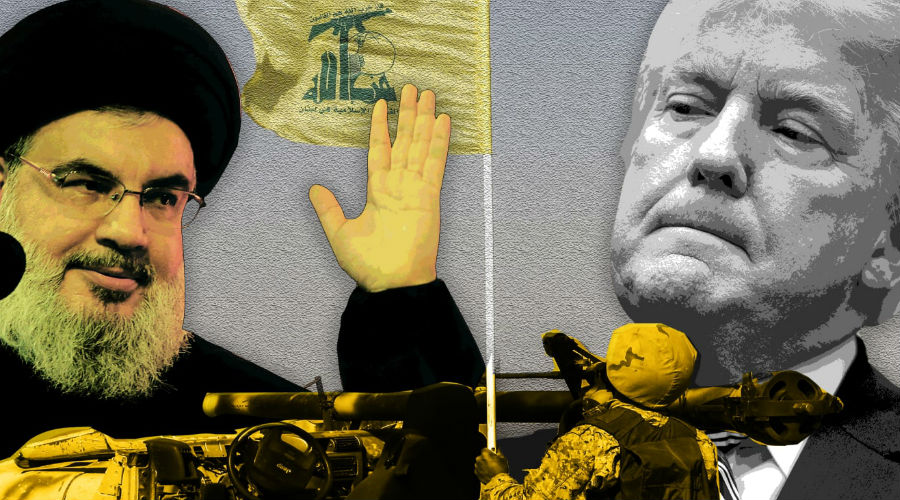On October 25, 2017, US Congress passed new sanctions against Lebanon’s Hezbollah to curb its political, economic and military activities as well as foreign relations. The three bills unanimously approved by the House of Representatives impose comprehensive sanctions against the Iran-backed terrorist group’s role after it has grown over the past years across the Middle East. In Syria, Iraq and Yemen in particular, Hezbollah stoked and took advantage of armed conflicts with one set goal in mind: achieving Iran’s policies.
Special Attention
Hezbollah’s funding received special attention from the House of Foreign Affairs Committee over the past six months, with discussions focused on three main topics: Hezbollah’s ties with Iran, loopholes used by the militant group to circumvent previous sanctions imposed in 2015, as well as threats posed on the interests of Washington's and its allies by the militia's weapons, activities and relations with Iran.
Significantly, the new sanctions target Hezbollah’s current suspicious role in the region. While previous sanctions targeted the group’s illegal trade in drugs, money laundering operations conducted through certain states as well as its role in conflicts and the deliberate use of civilians as human shields.
Needless to say that all Republican and Democratic congresspeople came to consensus on the Hezbollah-related measures acts as a prelude to a continuous mechanism against Iran and regional alliances. The development is of special significance because the Administration of President Donald Trump is bent on adopting the new strategy against threats posed by Iran in the region and, at the same time, its new policy on the 2015 nuclear agreement with Iran which, in Washington’s view, took advantage of the deal to consolidate its influence in the region.
Multiple Measures
Over the past period, and before the most recent sanctions, the United States was keen on countering Hezbollah’s and its direct threats to American interests. Two weeks before the new bills were passed into law, the U.S. Department of State offered rewards of between US$5 and $7 for information leading to the location, arrest, or conviction, in any country, of Fu’ad Shukr and Talal Hamiyah, two key leaders of Hezbollah who were involved in terrorist attacks against Americans. The rewards are the first offered by US for Hezbollah operatives in a decade.
Moreover, for the first time, footage showing Hezbollah’s terrorist attacks against the United States were shown at events held on March 25, 2017, and Lebanese businessman Kassim Tajideen, a key Hezbollah supporter already designated by the US as a terrorist, was accused of attempting to circumvent previous sanctions against him.
Different Approach
Tightening the economic screws on Hezbollah is not the sole target of the new sanctions passed by Congress, which indicates that Washington has adopted a different and global approach to address the threat of militant group’s activity in light of its expanding network of various activities in the Middle East. Escalated sanctions were required to fit the new US Administration's strategy for curbing the group.
During six months of congressional deliberations and amendments, the focus was maintained on diversifying and broadening the sanctions to target Hezbollah’s activity at all levels, including its networks, departments as well as ties with social and media entities seen as fronts used to circumvent the 2015 sanctions against it, as well as figures and entities supporting, or dealing with the militant group. This means Hezbollah’s internal alliances have also come under the expanded sanctions.
Special attention was given by US Representatives to crucial issues such as Hezbollah’s deliberate use of civilians in a war it fights on behalf of Iran in Syria, Iraq and Yemen. This issue in particular can usher in further sanctions by international rights organizations against Hezbollah with a focus on the negative implications of its activities in domestic and regional arenas.
The United States also seeks to convince European states to impose their own sanctions on Hezbollah that can impact relations with Iran, which still counts on European positions on Trump’s new policy regarding the nuclear deal in particular. The Trump Administration believes that the deal does not provide for tight sanctions on Iran’s nuclear program and that Iran continues to violates the spirit of the deal by deliberately continuing to conduct ballistic missile tests and support terrorism.
Moreover, the new US sanctions also aim to counter Iran’s incessant support to Hezbollah. Several reports indicate that financial transactions between Tehran and the Lebanon-based terrorist group are being conducted using “cash bags”. This might very well pave the way for new tight sanctions against Iran’s cross-border movements aimed at maintaining its influence within some states, establishing an overland corridor to territory held by its allies. The movements are an issue of concern for world powers involved in Middle East crises.
That said, it can be argued that the new US sanctions against Hezbollah usher in a new and different stage where several world powers will double their efforts to counter the terrorist group’s activities. That is because these activities are aimed at supporting Iran’s regional role thus exacerbating regional turmoil and instability while also supporting various terrorist organizations.


